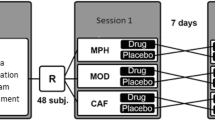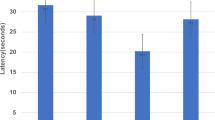Abstract
Caffeine consumption can be beneficial for cognitive functioning. Although caffeine is widely recognized as a mild CNS stimulant drug, the most important consequence of its adenosine antagonism is cholinergic stimulation, which might lead to improvement of higher cognitive functions, particularly memory. In this study, the scopolamine model of amnesia was used to test the cholinergic effects of caffeine, administered as three cups of coffee. Subjects were 16 healthy volunteers who received 250 mg caffeine and 2 mg nicotine separately, in a placebo-controlled double-blind cross-over design. Compared to placebo, nicotine attenuated the scopolamine-induced impairment of storage in short-term memory and attenuated the scopolamine-induced slowing of speed of short-term memory scanning. Nicotine also attenuated the scopolamine-induced slowing of reaction time in a response competition task. Caffeine attenuated the scopolamine-induced impairment of free recall from short- and long-term memory, quality and speed of retrieval from long-term memory in a word learning task, and other cognitive and non-cognitive measures, such as perceptual sensitivity in visual search, reading speed, and rate of finger-tapping. On the basis of these results it was concluded that caffeine possesses cholinergic cognition enhancing properties. Caffeine could be used as a control drug in studies using the scopolamine paradigm and possibly also in other experimental studies of cognitive enhancers, as the effects of a newly developed cognition enhancing drug should at least be superior to the effects of three cups of coffee.
Similar content being viewed by others
References
Bartus RT, Dean RL, Pontecorvo MJ, Flicker C (1985) The cholinergic hypothesis: A historical overview, current perspective, and future directions. Ann NY Acad Sci 444:332–358
Benowitz NL, Porchet H, Shiener L, Peyton JI (1988) Nicotine absorption and cardiovascular effects with smokeless tobacco use: comparison with cigarettes and nicotine gum. Clin Pharmacol Ther 44:23–38
Bond A, Lader M (1974) The use of analogue scales in rating subjective feelings. Br J Med Psychol 80:1–46
Briley M (1990) Biochemical strategies in the search for cognition enhancers. Pharmacopsychiatry 2:75–80
Cacabelos R, Nordberg A, Caamano J, Franco-Maside A, Fernandez-Novoa L, Gomez MJ, Alvarez XA, Takeda M, Prous J, Nishimura T, Winblad B (1994) Molecular strategies for the first generations of antidementia drugs (1). Tacrine and related compounds. Drugs of Today 30:295–337
Fagan D, Swift CG, Tiplady B (1988) Effects of caffeine on vigilance and other performance tests in normal subjects. J Psychopharmacol 2:19–25
Gilman AG, Rall TW, Nies AS, Taylor P (1990) Goodman and Gilman's the pharmacological basis of therapeutics. Pergamon Press, New York, pp 150–166
Houx PJ (1991) Cognitive aging and health-related factors. Datawyse, Datawyse
Jarvis M (1993) Does caffeine intake enhance absolute levels of cognitive performance? Psychopharmacology 110:45–52
Jones GMM, Sahakian BJ, Warburton DM, Gray JA (1992) Effects of acute subcutaneous nicotine on attention, information processing and short-term memory in Alzheimer's disease. Psychopharmacology 108:485–494
Klatsky AL, Armstrong MA, Friedman GD (1993) Coffee, tea, and mortality. Ann Epidemiol 3:375–381
Levin ED (1992) Nicotinic systems and cognitive function. Psychopharmacology 108:417–431
Lieberman HR, Wurtman RJ, Emde GG, Roberts C, et al. (1987) The effects of low doses of caffeine on human performance and mood. Psychopharmacology 92:308–312
Loke WH (1988) Effects of caffeine on mood and memory. Physiol Behav 44:367–372
Molchan SE, Mellow AM, Lawlor BA, Weingartner HJ, Cohen RM, Cohen MR, Sunderland T (1990) TRH attenuates scopolamine-induced memory impairment in humans. Psychopharmacology 100:84–89
Molchan SE, Martinez RA, Hill JL, Weingartner HJ, Thompson K, Vitiello B, Sunderland T (1992) Increased cognitive sensitivity to scopolamine with age and a perspective on the scopolamine model. Brain Res Rev 17:215–226
Nehlig A, Daval J-L, Debry G (1992) Caffeine and the central nervous system: mechanisms of action, biochemical, metabolic and psychostimulant effects. Brain Res Rev 17:139–170
Overall JE, Rhoades HM (1987) Adjusting p values for multiple tests of significance. In: Meltzer HY (ed) Psychopharmacology. The third generation of progress. Raven Press, New York, pp 1013–1018
Pollack I, Norman DA (1964) A non-parametric analysis of recognition experiments. Psychon Sci 1:125–126
Preda L, Alberoni M, Bressi S, Cattaneo C et al. (1993) Effects of acute doses of oxiracetam in the scopolamine model of human amnesia. Psychopharmacology 110:421–426
Rusted J, Eaton-Williams P (1991) Distinguishing between attentional and amnestic effects in information processing: the separate and combined effects of scopolamine and nicotine on verbal free recall. Psychopharmacology 104:363–366
Rusted JM, Warburton DM (1988) The effects of scopolamine on working memory in healthy young volunteers. Psychopharmacology 96:145–152
Stavric B (1992) An update on research with coffee/caffeine (1989–1990). Food Chem Toxicol 30:533–555
Sternberg S (1969) Memory scanning: mental processes revealed by reaction time experiments. Am Sci 57:421–457
Surgeon General (1988) Nicotine addiction: the health consequences of smoking. A report of the Surgeon General. US Department of Health and Human Services, Rockville
Swift CG, Tiplady B (1988) The effects of age on the response to caffeine. Psychopharmacology 94:29–31
Terry WS, Phifer B (1986) Caffeine and memory performance on the AVLT. J Clin Psychol 42:860–863
Wesnes K, Parrott A (1992) Smoking, nicotine and human performance handbook of human performance. Academic Press, New York, pp 127–167
Wesnes K, Simpson P, Kidd A (1988) An investigation of the range of cognitive impairments induced by scopolamine 0.6 mg s.c. Hum Psychopharmacol 3:27–41
Wesnes KA, Anand R, Simpson PM, Christmas L (1990) The use of a scopolamine model to study the potential nootropic effects of aniracetam and piracetam in healthy volunteers. J Psychopharmacol 4:219–232
Winer BJ (1971) Statistical principles in experimental design. McGraw-Hill, New York
Author information
Authors and Affiliations
Rights and permissions
About this article
Cite this article
Reidel, W., Hogervorst, E., Leboux, R. et al. Caffeine attenuates scopolamine-induced memory impairment in humans. Psychopharmacology 122, 158–168 (1995). https://doi.org/10.1007/BF02246090
Received:
Revised:
Issue Date:
DOI: https://doi.org/10.1007/BF02246090




